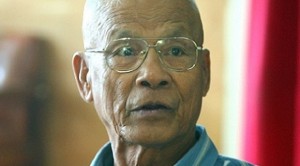MANILA, Philippines–Muntinlupa Rep. Rodolfo Biazon has asked the Department of National Defense and the Armed Forces of the Philippines to clarify reports that Filipino peacekeepers on the Golan Heights are not fairly paid because their superiors get the bigger slice of the monthly United Nations compensation package.
“The United Nations compensation for both officials and enlisted men (in the peacekeeping force) should be equal. I have heard that officials are getting more than their men. I [don’t] agree with that. The UN compensation is the same for all individuals regardless of rank,” Biazon said.
He noted that deployment for peacekeeping duty was highly sought in the military because of the compensation—$1,200, or roughly P50,000, a month for a minimum period of one year.
“We don’t lack for any volunteers in this area, Biazon said, adding that the United Nations also paid the government compensation for the equipment and gear used by the Filipino troops. For instance, the United Nations pays the government $5 a month for each of the firearms used by the peacekeepers.
He said that the United Nations coursed its payments to the defense department and the AFP through the Department of Foreign Affairs (DFA).
The defense department and the AFP “should clarify this issue and explain whether the UN allowed this discrimination in payment to peacekeepers,” he said.
Aside from resolving the question of compensation, Biazon said he would file a resolution saluting the work done by the Filipino peacekeepers on the Golan Heights.
“What our soldiers are doing there is cementing the reputation of Filipino soldiers who could be depended on to fulfill their duties even in the middle of a risky situation,” he said.
“I think our troops are used to fighting against rebels. That area is just like Basilan or Jolo, where rebels and not government troops are the enemy,” Biazon said, referring to the Golan Heights, which Syrian rebels fighting the government of President Bashar al-Assad infiltrated on Wednesday, seizing 44 Fijian peacekeepers and attacking two UN positions manned by 72 Filipino peacekeepers on Saturday.
The Filipinos fought back and were moved to safety early Sunday with help from Syria, Israel, Qatar and the United States, the United Nations said.
Unlike the Philippines’ legislated involvement in the Korea and Vietnam wars, Biazon said the Philippines’ presence on the Golan Heights, Somalia, Haiti and East Timor was part of the country’s contribution as a member of the United Nations.
He said the attack on the Filipino peacekeepers would test the United Nation’s system of troop deployment, specifically whether it should send reinforcements when its forces were under attack. He said the DFA should clarify the matter with the United Nations.
Biazon said that as a former soldier, he would not endorse a withdrawal of the troops using the clash with rebels as a justification.
“Our reasons should never be that we are scared of the enemy. The only reason for leaving that I would accept is due to the spread of Ebola and not because they are in danger of getting into a fight,” he said.


